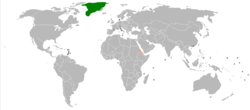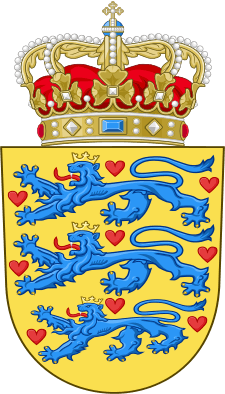Denmark–Eritrea relations
 |
|
Denmark |
Eritrea |
|---|---|
Denmark–Eritrea relations refers to the current and historical relations between Denmark and Eritrea. Denmark is represented in Eritrea through its embassy in Nairobi, Kenya,[1] and Eritrea is represented in Denmark through its embassy in Stockholm, Sweden.[2] Diplomatic relations were established in 1993.[3] Relations between Denmark and Eritrea have been bad, since Denmark decided to suspend development cooperation with Eritrea in January 2002, and close its embassy in June 2002.[4] After the Eritrean–Ethiopian War from 1998 to 2000, Denmark sent 320 soldiers to the United Nations Mission in Ethiopia and Eritrea to monitor a ceasefire in the border war.[5]
History
In 1950, Denmark and 15 other countries voted for a united Eritrea and Ethiopia under Haile Selassie in the United Nations.[6] During the Eritrean War of Independence, Denmark sent humanitarian assistance to the Eritrean People's Liberation Front.[7] In the 1980s, the parliament of Denmark passed a resolution supporting the independence in Eritrea.[8] Denmark opened an embassy in Asmara in July 1997,[9] but closed it in June 2002,[4] because of the lack of democracy in the country.[10] In October 2001, Eritrea expelled the Italian ambassador, and later Denmark recalled its ambassador to Eritrea for consultations.[11] In 2001, Denmark ended aid to Eritrea because of the arrest of Eritrean students and opposition politicians by President Isaias Afewerki, and the lack of freedom of the press in Eritrea.[12] Another reason was the new liberal government of Denmark, that decided to reduce the aid budget.[13]
Development assistance
Eritrea was chosen as a Danish programme country from 1993 to 1996, and again from 1999 to 2001. Denmark has been supporting Eritrea with counteracting land degradation. In 1996, Denmark contributed $35,000 through United Nations Convention to Combat Desertification and in 1997, $111,000 through United Nations Truce Supervision Organization to Eritrea.[14] In 1996, Denmark assisted 112 million DKK to the agriculture sector,[15] and 80 million DKK to the education sector.[16] The total aid to the Eritrean agricultural programme amounted 112 million DKK. (USD 15 million)[14] From 2001 to 2004, Denmark assisted Eritrea 36.60 million DKK for the justice sector.[17] In 2001, both countries agreed to develop the legal sector.[13] In 2001, Denmark donated $2.199 million to support the clearance of landmines in Eritrea.[18]
High level visits
In the 2000 Arab League summit in Cairo, Eritrean President Isayas Afewerki met Prince Frederik and called the relationship between Denmark and Eritrea "exemplary".[19][20] In February 2001, Danish Foreign Minister Mogens Lykketoft visited Eritrea, to discuss development programmes between Denmark and Eritrea.[21]
References
- ↑ "H.E. Geert Aagaard Andersen, New Danish Ambassador to Kenya". Government of Denmark, Danish embassy in Nairobi, Kenya. Ministry of Foreign Affairs (Denmark). Retrieved 28 June 2011.
- ↑ "Embassy of Eritrea in Stockholm". Government of Eritrea. Retrieved 24 June 2011.
- ↑ Africa analysis: the fortnightly bulletin on financial and political trends, 163–187. Africa Analysis Ltd. 1993. Retrieved 24 June 2011.
Eritrea and Denmark established diplomatic relations at ambassadorial level
- 1 2 "Danske mineryddere på vej hjem fra Eritrea". Politiken. 2 September 2002. Retrieved 3 February 2011.
- ↑ "Moralens vogtere". Jyllandsposten (in Danish). 4 April 2001. Retrieved 28 June 2011.
- ↑ "Ethiopia, Eritrea to merge". 14. Iowa: Telegraph Herald. 3 December 1950: 4. Retrieved 25 June 2011.
Besides the United States, the sponsoring powers were Bolivia, Brazil, Burma, Canada, Denmark, Ecuador, Greece, Liberia, Mexico, Panama, Paraguay, Peru
- ↑ "Eritrean Rebels Have Non-Communist Support". New York Times. 21 December 1987. Retrieved 24 June 2011.
- ↑ "Eritrean Rebels to Form Own Rule, Separate From Ethiopian Government". Washington Post. 30 May 1999. Retrieved 24 June 2011.
- ↑ "Danmark åbner ambassade i Eritrea" (in Danish). NPINVESTOR. 1 July 1997. Retrieved 24 June 2011.
- ↑ "'Front Load' Africa's Development, Say UN Humanitarian Aid Coordinators". allAfrica.com. Retrieved 25 June 2011.
- ↑ Africa South of the Sahara 2004. Europe Publications. 2004. p. 391. ISBN 1-85743-183-9. Retrieved 24 June 2011.
- ↑ "Eritrea vil selv bestemme". Jyllandsposten (in Danish). Retrieved 24 June 2011.
- 1 2 "Managing Aid Exit and Transformation: Eritrea Country Case Study" (PDF). Organisation for Economic Co-operation and Development. p. 18. ISBN 978-91-586-4064-1. Retrieved 24 June 2011.
- 1 2 "UNITED NATIONS CONVENTION TO COMBAT DESERTIFICATION: Report from Denmark" (PDF). April 2000. Retrieved 24 June 2011.
- ↑ "Bekendtgørelse om overenskomst af 17. november 1995 med Eritrea om dansk støtte til etablering af et nationalt skovfrøcenter i Eritrea under Landbrugsministeriet" (in Danish). Retsinformation. Retrieved 28 June 2011.
- ↑ "Bekendtgørelse om overenskomst af 26. april 1996 med Eritrea om dansk støtte til primær uddannelse i Eritrea" (in Danish). Retsinformation. Retrieved 28 June 2011.
- ↑ "Danidas Årsberetning 04". DANIDA (in Danish). Retrieved 24 June 2011.
- ↑ Landmines, International Campaign to Ban (2002). Landmine Monitor report, 2002 : toward a mine-free world. New York: Human Rights Watch. p. 251. ISBN 1-56432-277-7. Retrieved 24 June 2011.
- ↑ "Nyrups 65 års fødselsdag". Socialdemokraterne. Retrieved 6 July 2011.
- ↑ "Eritrean president in talks with Danish prince, parliamentary defence committee". BBC Monitoring. 7 May 2001. Retrieved 6 July 2011.
- ↑ "Eritrea: Danish foreign minister arrives in Asmara". BBC Monitoring. 22 April 2001. Retrieved 25 June 2011.

.svg.png)
